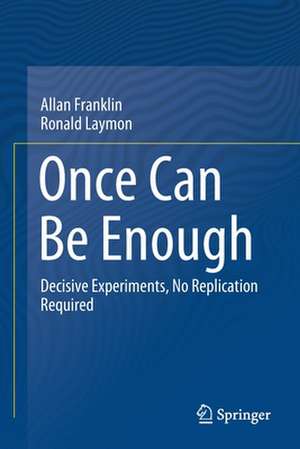Once Can Be Enough: Decisive Experiments, No Replication Required
Autor Allan Franklin, Ronald Laymonen Limba Engleză Paperback – 24 noi 2021
| Toate formatele și edițiile | Preț | Express |
|---|---|---|
| Paperback (1) | 579.02 lei 6-8 săpt. | |
| Springer International Publishing – 24 noi 2021 | 579.02 lei 6-8 săpt. | |
| Hardback (1) | 585.26 lei 6-8 săpt. | |
| Springer International Publishing – 24 noi 2020 | 585.26 lei 6-8 săpt. |
Preț: 579.02 lei
Preț vechi: 681.20 lei
-15% Nou
Puncte Express: 869
Preț estimativ în valută:
110.83€ • 120.43$ • 93.16£
110.83€ • 120.43$ • 93.16£
Carte tipărită la comandă
Livrare economică 21 aprilie-05 mai
Preluare comenzi: 021 569.72.76
Specificații
ISBN-13: 9783030625672
ISBN-10: 3030625672
Pagini: 181
Ilustrații: XII, 181 p. 51 illus.
Dimensiuni: 155 x 235 mm
Greutate: 0.28 kg
Ediția:1st ed. 2021
Editura: Springer International Publishing
Colecția Springer
Locul publicării:Cham, Switzerland
ISBN-10: 3030625672
Pagini: 181
Ilustrații: XII, 181 p. 51 illus.
Dimensiuni: 155 x 235 mm
Greutate: 0.28 kg
Ediția:1st ed. 2021
Editura: Springer International Publishing
Colecția Springer
Locul publicării:Cham, Switzerland
Cuprins
Introduction.- The Meselson-Stahl Experiment: “The Most Beautiful Experiment in Biology”.- The Discovery of the Positron.- The Discovery of the Omega Minus Hyperon.- Once Should Have Been Enough: Gregor Mendel, “Experiments in Plant Hybridization”.- Once Came Close To Being Enough: Electron Polarization and Parity Nonconservation.- The Discovery of Parity Nonconservation.- The Search for the Magnetic Monopole.- Conclusion.
Notă biografică
Allan Franklin is Professor of physics emeritus at the University of Colorado. He began his career as an experimental high-energy physicist and later changed his research area to history and philosophy of science, particularly on the roles of experiment. He has twice been Chair of the Forum on the History of Physics of the American Physical Society and served two terms on the Executive Council of the Philosophy of Science Association. In 2016, Franklin received the Abraham Pais Prize for History of Physics from the American Physical Society. He is the author of twelve books including most recently Shifting Standards: Experiments in Particle Physics in the Twentieth Century, What Makes a Good Experiment?: Reasons and Roles in Science, and Is It the Same Result? Replication in Physics. He and Ronald Laymon are the co-authors of Measuring Nothing, Repeatedly.
Ronald Laymon is Professor of philosophy emeritus at the Ohio State University where he specialized in the history and philosophy of science. He has published widely, was the recipient of multiple National Science Foundation research grants, and was a Fellow at the Center for the Philosophy of Science at the University of Pittsburgh and a Resident Scholar at the Rockefeller Foundation’s villa in Bellagio. In 1995, he took advantage of an early retirement option and completed a law degree at the University of Chicago School of Law in 1997. He then went on to practice large-scale commercial litigation at the Jones Day law firm where he had the good fortune to serve as second chair on a case before the United States Supreme Court. Now retired from the full-time practice of law, Laymon does consulting work for a biotech, intellectual property firm that facilitates the open source creation of therapeutic technologies. Retirement has also made it possible for Laymon to resurrect his interest and earlier work in the history and philosophy of science. He and Allan Franklin are the co-authors of Measuring Nothing, Repeatedly.
Ronald Laymon is Professor of philosophy emeritus at the Ohio State University where he specialized in the history and philosophy of science. He has published widely, was the recipient of multiple National Science Foundation research grants, and was a Fellow at the Center for the Philosophy of Science at the University of Pittsburgh and a Resident Scholar at the Rockefeller Foundation’s villa in Bellagio. In 1995, he took advantage of an early retirement option and completed a law degree at the University of Chicago School of Law in 1997. He then went on to practice large-scale commercial litigation at the Jones Day law firm where he had the good fortune to serve as second chair on a case before the United States Supreme Court. Now retired from the full-time practice of law, Laymon does consulting work for a biotech, intellectual property firm that facilitates the open source creation of therapeutic technologies. Retirement has also made it possible for Laymon to resurrect his interest and earlier work in the history and philosophy of science. He and Allan Franklin are the co-authors of Measuring Nothing, Repeatedly.
Textul de pe ultima copertă
There has recently been considerable discussion of a “replication crisis” in some areas of science. In this book, the authors argue that replication is not a necessary criterion for the validation of a scientific experiment. Five episodes from physics and genetics are used to substantiate this thesis: the Meselson-Stahl experiment on DNA replication, the discoveries of the positron and the omega minus hyperon, Mendel’s plant experiments, and the discovery of parity nonconservation. Two cases in which once wasn’t enough are also discussed, the nondiscovery of parity nonconservation and the search for magnetic monopoles. Reasons why once wasn’t enough are also discussed.
Caracteristici
Provides a focused analysis of the interplay between discovery and confirmation Explores the role played by mistake, contentious disagreement, and serendipity in science Argues that replication is not a necessary criterion for the validation of a scientific experiment
